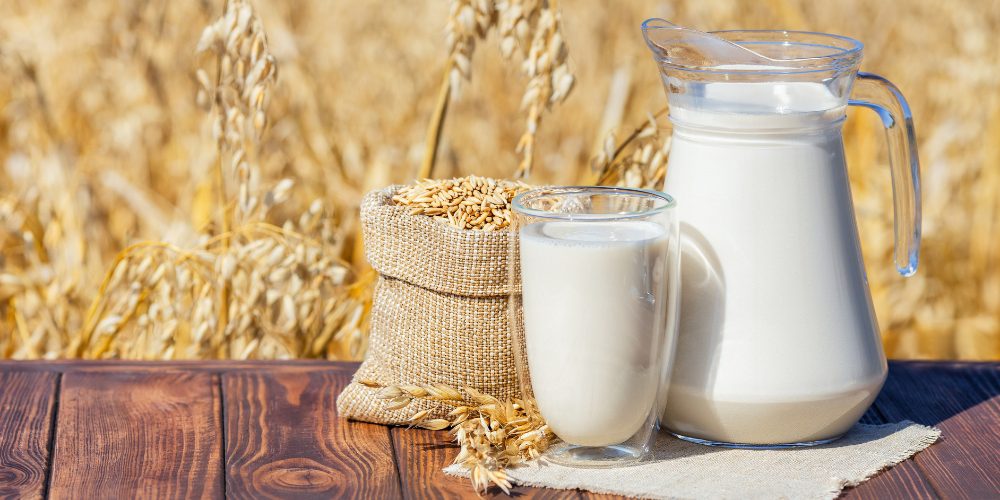Making your own oat milk at home is not only cost-effective but also allows you to control the ingredients and avoid additives often found in store-bought versions. Here's a comprehensive guide to making your own delicious and nutritious oat milk.
Ingredients:
- 1 cup rolled oats (organic, if possible)
- 4 cups water
- Pinch of salt (optional)
- 1 tsp vanilla extract (optional)
- 1-2 dates or 1 tbsp maple syrup for sweetness (optional)
Equipment:
- Blender
- Fine-mesh strainer or cheesecloth
- Glass bottle or jar for storage

 Steps to Make Oat Milk:
Steps to Make Oat Milk:
1. Soak the Oats (Optional):
- Soak oats in water for 30 minutes to reduce phytic acid and improve digestibility
- Drain and rinse well
2. Blend:
- Add oats and fresh water to the blender
- Blend on high for 30-45 seconds (don't over-blend to avoid slimy texture)
3. Strain:
- Pour the mixture through a fine-mesh strainer or cheesecloth
- Gently press to extract all the liquid (don't over-squeeze to avoid sliminess)
4. Flavor (Optional):
- Return the strained milk to the blender
- Add salt, vanilla, and sweetener if desired
- Blend briefly to combine
5. Chill and Store:
- Transfer to a glass bottle or jar
- Refrigerate for at least an hour before serving
- Shake well before each use
 Tips for Perfect Oat Milk:
Tips for Perfect Oat Milk:
1. Use cold water to prevent the oats from cooking and becoming slimy
2. Don't over-blend or over-strain, as this can lead to a gummy texture
3. For a creamier milk, use slightly less water
4. Experiment with different oat varieties (e.g., steel-cut, quick oats) for different textures
Nutritional Benefits of Oat Milk:
- Rich in fiber, particularly beta-glucan, which supports heart health
- Naturally low in fat and calories
- Good source of B vitamins, including thiamin and folate
- Contains minerals like manganese, phosphorus, and magnesium
- Lactose-free and suitable for those with dairy allergies or intolerances
Creative Uses for Oat Milk:
1. Coffee and Tea: Creates a creamy, frothy addition to hot beverages
2. Smoothies: Adds a smooth texture and mild flavor to smoothies
3. Baking: Use in place of dairy milk in baked goods
4. Breakfast Cereals: Pour over your favorite cereal or granola
5. Cooking: Use in savory dishes like soups or sauces for added creaminess
Storing Your Oat Milk:
- Keep refrigerated in an airtight container
- Consume within 5-7 days
- Shake well before each use, as separation is natural
Troubleshooting:
- If milk is too thin: Use less water or add more oats
- If milk is slimy: Reduce blending time and avoid over-straining
- If milk separates: This is normal, just shake before use
Customizing Your Oat Milk:
- Add a tablespoon of coconut oil for richness
- Include a handful of soaked cashews for extra creaminess
- Experiment with different flavors like cinnamon, cocoa powder, or strawberries
As a Naturopathic Doctor, I appreciate oat milk as a nutritious, environmentally friendly alternative to dairy milk. Making it at home allows you to avoid preservatives and additives while customizing it to your taste preferences and nutritional needs.
Remember, while oat milk is nutritious, it's not a complete protein source like dairy milk. If you're using it as a primary milk substitute, ensure you're getting adequate protein, calcium, and vitamin B12 from other sources in your diet.
By making your own oat milk, you're not only creating a delicious beverage but also engaging in a mindful, sustainable practice that connects you more deeply with your food. Enjoy the process and the delicious results!

